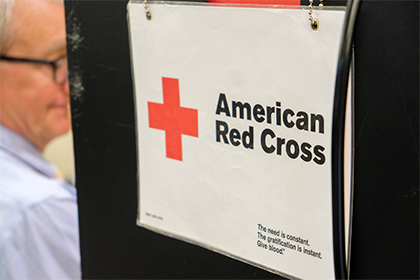The Larner College of Medicine, in collaboration with the American Red Cross, hosted its first annual blood drive on June 21, in the Larner Classroom. More than 60 members of the Larner community donated blood.

The American Red Cross cosponsored Larner's blood drive
The Larner College of Medicine, in collaboration with the American Red Cross, hosted its first annual blood drive on June 21, in the Larner Classroom. More than 60 members of the Larner community donated blood.
Blood drives play an important role in ensuring a steady and reliable supply of blood for medical emergencies, surgeries, and critical treatments. Blood donations can provide a lifeline for cancer patients, organ transplant recipients, and people recovering from traumatic injuries. Larner College of Medicine Dean Richard L. Page, M.D., recognized the value of this lifeline, drawing not only from his professional background as a cardiologist but also from his personal experience.
"I've shared with many in our community how cancer has touched my family," stated Page. "When my granddaughter's blood counts were dangerously low, donor blood and platelets saved her life. I witnessed, firsthand, the lifesaving impact of generous donors," said Page with deep gratitude. "Every person who receives the gift of blood is benefiting from someone's selfless act of sharing the gift of life"
Recognizing this important issue, the Larner College of Medicine remains dedicated to supporting such causes. "As a medical school, we actively acknowledge our obligation to contribute to this vital cause and make a positive impact on the lives of those in need," remarked Page. He also highlighted that while Larner's blood drive will continue on an annual basis, there are monthly opportunities to donate blood through UVM Medical Center.
Beyond the direct impact on patients, blood drives also promote active community participation and engagement. They provide a platform for individuals to contribute to the well-being of others and create a tangible difference within their community. This spirit of unity and altruism was evident during the inaugural Larner College of Medicine Blood Drive, with sixty-four members of the community participating, showcasing their dedication to strengthening the social fabric and embracing collective responsibility.
"I was heartened, but not surprised, by the response we had from our community," said Page. "We thought we'd be fortunate to have thirty volunteers. However, we had over double that number. I couldn't have imagined a better outcome for our first annual blood drive."